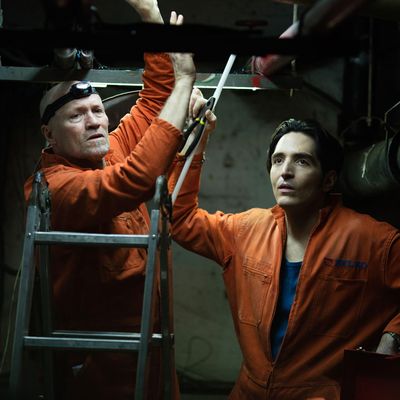
The thing about Battle Royale, for all the notoriety that preceded its release in the U.S., was that it was smart enough to be fake. An action-horror movie about junior-high kids murdering each other would be unwatchable and horrific if it was treated with the shaky-cam gravitas that’s the default for many contemporary horror films. But watch Battle Royale now — with its theatrical tableau and fruit-punch sprays of blood — and it’s fairly obvious that director Kinji Fukasaku wasn’t interested in violence so much as making the ultimate teen drama. Half the kills are cutaway shots.
The Belko Experiment, a deeply ugly and unnecessary film written by Guardians of the Galaxy director James Gunn, pitches itself as a Battle Royale in an office building. Ties and pencil skirts replace school uniforms, workplace grudges and romances replace adolescent angst, but this time, the kills are real. The concept is not without merit — what if your boring job, in all its abstract drudgery, was just a front for a sadistic human experiment? But ultimately, The Belko Experiment has nothing more to say about such modern absurdities than Office Space did nearly two decades ago with a lot fewer spattered brains. The fundamental ironic juxtaposition — ultraviolence meets corporate banality — is a bludgeon that never feels fresh no matter how many times it’s driven into our aching skulls.
The setting is the Bogota office of Belko, a murkily defined nonprofit that mostly sounds like a temp agency. Driving into work one morning, the local employees are turned away at the gate by the new, heavily armed security detail, while the English-speaking staff are sent through. One of them is our hero, Michael, who’s played by John Gallagher Jr., a sharp and nuanced actor who someday will escape the curse of being cast as Not Jim Halpert. Inside appears to be just another boring office, albeit one built on a pile of dirt in rural Colombia where the employees are all fitted with tracker implants — in case of a hostage situation, they’re told.
As it turns out, the Belko staff are treated to the mother of all hostage situations: The building is covered in armored walls, and a mysterious voice gets on the intercom to announce that they must kill two of their fellow employees in order to keep 30 more of them from being killed. The trackers in their heads are, of course, fitted with explosives, and the mysterious voice demonstrates its power when all the employees have assembled in the lobby in their first tentative attempt to reason their way out of the situation.
The problem is that director Greg McLean (also behind the divisive modern grindhouse film Wolf Creek) doesn’t do much to visually distinguish the head explosions — and there are a lot of them — from sniper gunshots. Perhaps this is intentional, but the effect is the image of 80 or so terrified humans running around their workplace dodging what may as well be an active shooter. They’ve been shaded in just enough dimensions that we can’t dismiss them as one-dimensional horror movie props, but we don’t know them well enough for their deaths to mean anything. So it’s just terror and chaos, too well-choreographed not to recall any number of mass shootings in the last decade.
Are we meant to take some kind of sinister glee in watching cubicles and cafeterias get drenched in viscera? Is it supposed to feel ironic or subversive to imagine a similar scene in our own offices? Characters periodically take an elevator to rendezvous or plan their next escape attempt, and as they catch their breath and wipe the blood from their eyes, we hear the kind of lounge-y elevator music that doesn’t really exist outside of punch lines anymore. What’s the joke? What is being satirized — the expectation that we can go about our boring lives without finding ourselves in the middle of a mass killing? Message received.
The Belko Experiment is the kind of film many people will walk out of, and those who stick it out to the end just to see the curtain pulled back will be sorely let down by an ending so anti-climactic I could spoil it right now and you’d ask, “That’s it?” If the script feels undercooked, that’s because it was: Gunn originally wrote in the period between 2006’s Slither and 2009’s Super, then walked away from directing the project during a time of personal upheaval. As he put it, making this movie “didn’t seem to be the way I wanted to spend the next few months of my life.” Why he or the film’s producers thought anyone else would feel differently remains a mystery.




